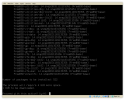- Thread Starter
- #26
No offence pkgbase looks to me like an idea without any clear deadline.
I don't imagine that a deadline was ever intended, there is the timeline above.
Also above:
Michael W Lucas has a few laughs …
Personally: I'll refocus on PkgBase after <{link removed}> (recently discussed in EFNet) is progressed.
Last edited:

